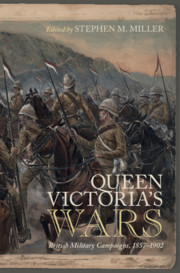Book contents
- Queen Victoria’s Wars
- Queen Victoria’s Wars
- Copyright page
- Contents
- Maps
- Contributors
- Acknowledgements
- 1 Introduction
- 2 The Indian Rebellion, 1857–1858
- 3 Punitive Expeditions in China, 1857–1860
- 4 The Expedition to Abyssinia, 1867–1868
- 5 The New Zealand Wars, 1845–1872
- 6 The Third Anglo-Asante War, 1873–1874
- 7 The Second Afghan War, 1878–1880
- 8 The Anglo-Zulu War, 1879
- 9 The First Anglo-Boer War, 1880–1881
- 10 Egypt and the Sudan, 1881–1885
- 11 The Third Anglo-Burmese War and the Pacification of Burma, 1885–1895
- 12 The Tirah Campaign, 1897–1898
- 13 Reconquest of the Sudan, 1896–1898
- 14 The South African War, 1899–1902
- 15 Conclusion
- Index
- References
7 - The Second Afghan War, 1878–1880
Published online by Cambridge University Press: 01 June 2021
- Queen Victoria’s Wars
- Queen Victoria’s Wars
- Copyright page
- Contents
- Maps
- Contributors
- Acknowledgements
- 1 Introduction
- 2 The Indian Rebellion, 1857–1858
- 3 Punitive Expeditions in China, 1857–1860
- 4 The Expedition to Abyssinia, 1867–1868
- 5 The New Zealand Wars, 1845–1872
- 6 The Third Anglo-Asante War, 1873–1874
- 7 The Second Afghan War, 1878–1880
- 8 The Anglo-Zulu War, 1879
- 9 The First Anglo-Boer War, 1880–1881
- 10 Egypt and the Sudan, 1881–1885
- 11 The Third Anglo-Burmese War and the Pacification of Burma, 1885–1895
- 12 The Tirah Campaign, 1897–1898
- 13 Reconquest of the Sudan, 1896–1898
- 14 The South African War, 1899–1902
- 15 Conclusion
- Index
- References
Summary
In 1878, Russia challenged British interests in Afghanistan by sending a mission to Kabul, which the Afghan Amir, Sher Ali Khan, appeared to have welcomed. In defence of his forward policy, the British Viceroy in India, Lord Lytton, sent his own emissary. When he was denied entry, the British issued an ultimatum which the Amir rejected. The British invaded in order to secure regime change. Afghan forces included both traditional irregular militias and regulars trained with British weapons by former Indian NCOs. They enjoyed superior numbers, local knowledge, mobility, and some enterprising commanders. British superiority in weapons, discipline, and training was marked. They also adopted khaki uniforms which replaced the traditional scarlet, which frustrated the Afghan use of the long-range jezail. These advantages enabled the defeat of Afghan forces under the new Amir, Ayub Khan, at the Battle of Ahmed Khel (19 April 1880). British and Indian forces were insufficient in numbers, however, to control much of the country. A defeat at Maiwand led to a renewed British commitment and General Sir Frederick Roberts’ successful 300-mile march brought decisive victory at Kandahar. The Amir was replaced with a more compliant leader, and the British withdrew.
Keywords
- Type
- Chapter
- Information
- Queen Victoria's WarsBritish Military Campaigns, 1857–1902, pp. 126 - 145Publisher: Cambridge University PressPrint publication year: 2021



